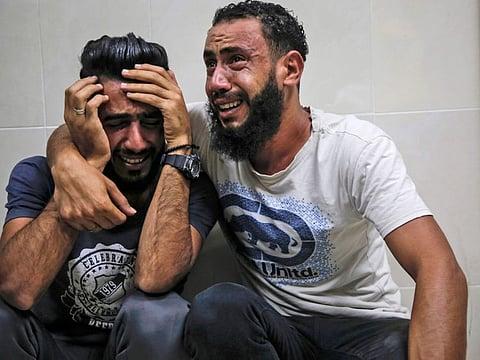Israel’s dehumanisation of Palestinians continues
People of Palestine are engaged in a poetic act that defines the essence of human spirit

As if we need another dreary reminder that, in historic Palestine, yesterday’s oppressed are today’s oppressors!
Look at the racialist venom and deep hatred that many Israelis, in particular right-wing legislators elected to the Knesset and messianic colonists ensconced on occupied Palestinian land, harbour for Palestinians — with that venom often leading to gratuitous violence.
“When video surfaced this month of settlers throwing stones at Palestinians while Israeli soldiers looked on, I was not surprised,” Frima Bubis wrote on November 7 in the Forward, one of the most influential Jewish publications in America. Bubi had served as an Israeli soldier in the occupied West Bank between 2013 and 2015.
What she witnessed there had driven her to join Breaking the Silence, an organisation of Israeli veterans who took it upon themselves to expose to the Israeli public, and to the world at large, the dreadful reality of everyday life under occupation.
In that regard, they will do anything to humiliate you, brand you, pauperise you, incarcerate you, beat you, indeed kill you, all the while, in their frenzy, valuing what you hate (oppression) and hating what you value (freedom)Fawaz Turki
“I received dozens of reports from frantic Palestinians about violence by Israeli settlers,” she wrote her opinion piece about serving in the Army. “A farmer in Deir Sharaf awaking at sunrise to more than 100 young olive trees destroyed before having the chance to bear fruit. A 14-year-old boy who was abducted and beaten by settlers, and later abandoned in a field nearby”.
Then about another incident, she wrote: “I remember one Saturday morning when a group of settlers destroyed water tanks [provided to the villagers by USAID] in Madana, and another time [when] a family man from Buria reported two Molotov cocktail thrown at his house while he was putting his children to sleep.”
What lies behind these demonstrations of hatred? We understand — often even sympathise with — victims of oppression who hate their victimiser for the humiliation, the cruelty and, above all, the “otherness” thrust upon him, but we wonder why the victimiser so passionately hates his victims, whose humanity he feels the need to reduce to a fragment. Are there psychological forces at play here that explain this dynamic, ever present in Palestine for the last five decades?
The dynamic that animates the relationship between oppressor and oppressed was first explored in 1802 by Fredrich Hegel, but the German philosopher is too obtuse to quote here. The conventional wisdom, however, has it that an oppressor hates those whom he oppresses because he sees them as less than human, or at best an inferior species of men and women. Or perhaps, well, he just fails to “appreciate” their humanity.
I beg to differ, as would, I suspect, many of us who had been engaged in looking at the occupation all these years — in looking, if you wish, at the perpetual purgatory Palestinians inhabit under Israel’s rule of the gun. The reason Israel degrades Palestinians at every turn, in fact, is for the opposite reason: Precisely because Palestinians are human, so very much human.
You see, in order to justify, to your conscience, the oppression you inflict on another human being, you begin by dehumanising him, that is, stripping him of his human attributes. You do that by what Frantz Fanon called in his iconic book, The Wretched of the Earth (1961) le proccessus de ‘chosification’ — turning a human being into a “thing”.
That explains why, for example, in 1999 Rafael Eitan, once Israel’s Army Chief of Staff, called Palestinians “drugged cockroaches in a bottle” It’s tough to oppress human beings whose humanity you recognise. cockroaches, on the other hand, well, you squash them underfoot.
For Israel, there is no way out
You don’t deny the human attributes of someone you respect. Someone engaged in a struggle freedom. And are not a people struggling for freedom a people engaged in a poetic act that defines the essence of our human being? Nothing enrages Israelis more, nothing triggers the aggressions licensed by their sense of messianic entitlement to the land, than to see Palestinians, the other, staking a claim to it.
In that regard, they will do anything to humiliate you, brand you, pauperise you, incarcerate you, beat you, indeed kill you, all the while, in their frenzy, valuing what you hate (oppression) and hating what you value (freedom).
In short, the answer to why so many Israelis hate Palestinians so much, denying them even the very name they derive from their ancestral patrimony, may be found in that one surprising place — where: It is precisely because Israelis recognise that Palestinians are indeed “human” beings, not “drugged cockroaches in a bottle”, that they feel the need to strip them, at every turn, of their humanity and turn them into ghosts.
But, lest we forget, when ghosts confront you with their presence, they can scare the bejesus out of you. For Israel, there is no way out. Even the spiritual cargo diaspora Palestinians carry on their backs in exile bespeaks of Palestine.
—Fawaz Turki is a writer and lecturer who lives in Washington and the author of several books, including the Disinherited: Journal of a Palestinian Exile.



